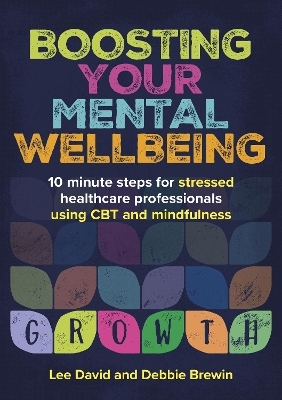
Boosting Your Mental Wellbeing
Scion Publishing Ltd (Verlag)
978-1-914961-24-3 (ISBN)
The authors show how making small changes in key life areas can have a surprisingly significant impact on mood and can help improve our wellbeing, all in 10 minutes a day.
This book describes key skills that allow us to thrive both at work and in our personal lives. Making time to boost our wellbeing is realistic and achievable, and making small changes in key life areas can have a surprisingly significant impact on mood.
Key Features:
Practical guidance to combat stress and burnout in primary care
10-minute techniques, to fit in with busy lifestyles
Features, CBT, Mindfulness and Behavioural Action techniques
Working in primary care can be stressful and exhausting and our connection is easily broken with the aspects that made it rewarding and worthwhile. Once broken, it is all too easy to slip into a negative spiral of over-working, failing to switch off, and not spending enough time on rest and recuperation.
The book introduces six GROWTH steps, all possible in 10 minutes. These are based on techniques such as CBT, mindfulness and behavioural activation, that help lead to positive mental health and significantly improved wellbeing.
The first half of the book includes exercises and activities to help you practise and learn more about each of the GROWTH steps. The second half then focuses on applying the steps to some of the common difficulties that we all experience in primary care, such as:
overcoming low mood, low motivation and burnout
coping with anxiety, uncertainty and worry, especially if you are training, taking exams or simply feeling overwhelmed
managing change and loss
The book can help you avoid imposter syndrome, strengthen important relationships, navigate tricky encounters, and cope better with trauma and complaints.
The book cannot remove all the stress that comes from working on the front-line, but it does offer you simple practical help to manage stress much better by boosting your resilience and improving your coping strategies. And it only needs to take 10 minutes a day!
Acknowledgements; About the authors; Introduction
PART I
Chapter 1 Follow your inner Guide
1.1 What do we mean by your inner Guide?
1.2 Finding your values
1.3 Living your values
1.4 Recognising your needs
1.5 Purpose and meaning
1.6 Personal qualities
1.7 Troubleshooting finding your inner Guide
Chapter summary: using your Guide
Chapter 2 Ready for Action
2.1 The importance of taking action
2.2 What is taking action?
2.3 From values to actions
2.4 Are you living according to your values?
2.5 Plans, goals and actions
2.6 What gets in the way?
2.7 Taking a Towards step
2.8 Planning for the long term
Chapter summary: Ready for Action
Chapter 3 Open and Observe
3.1 Open and Observe skills
3.2 Observe this moment: notice the ‘NOW’
3.3 Finding flow
3.4 Flexible attention
3.5 Practising mindfulness
3.6 Practising your Open and Observe skills
3.7 Understanding our reactions
3.8 Stepping back and making space
3.9 Finding enjoyment and contentment
Chapter summary: Open and Observe
Chapter 4 Wise Mind
4.1 What is Wise Mind?
4.2 We are not our thoughts
4.3 Thoughts and emotions
4.4 Negative thinking patterns
4.5 Let go of the struggle
4.6 ‘Defuse’ from unhelpful thoughts
4.7 Wise choices
4.8 Support and encouragement
4.9 Repetitive and intrusive thoughts
Chapter summary: Wise Mind
Chapter 5 Thrive and Balance
5.1 The impact of stress
5.2 What is stress?
5.3 Factors influencing stress
5.4 Stress, pressure and performance
5.5 Coping with stress
5.6 Three circles model of emotions
5.7 The role of self-compassion
5.8 Developing self-compassion
5.9 Balancing the circles
Chapter summary: Thrive and Balance
Chapter 6 Healthy Life Habits
6.1 What are Healthy Life Habits?
6.2 What gets in the way?
6.3 Finding motivation to change
6.4 Physical activity
6.5 Healthy eating habits
6.6 Healthy sleep habits
6.7 Other unhealthy habits
6.8 Caring for physical health
6.9 Overcoming unhelpful life habits
6.10 GROWTH skills for healthy life habits
Chapter summary: Healthy Life Habits
PART II
Chapter 7 Personality traits and traps
7.1 Personality traits: strengths and vulnerabilities
7.2 Unhealthy perfectionism
7.3 Imposter syndrome
7.4 The ‘chronic hero’: excessive responsibility and guilt
Chapter summary: Personality traits and traps
Chapter 8 Low mood
8.1 Recognising low mood
8.2 When low mood becomes depression
8.3 What are the causes of low mood?
8.4 Different responses to the same situation
8.5 The route out of the swamp
8.6 Activity diary
8.7 Keeping it going
8.8 Managing negative thinking
Chapter summary: Low mood
Chapter 9 Anxiety and uncertainty
9.1 What is anxiety?
9.2 Are you struggling with anxiety?
9.3 Why do we have anxiety?
9.4 Anxiety is not dangerous!
9.5 Anxious mind visitors
9.6 Anxiety and Away actions
9.7 Uncertainty in primary care
9.8 GROWTH skills to cope with anxiety and uncertainty
Chapter summary: Anxiety and uncertainty
Chapter 10 Connecting and communicating
10.1 The importance of connection
10.2 Personality traits and relationships
10.3 Relationship circles
10.4 Strengthening important relationships
10.5 Expanding relationship circles
10.6 Social and performance stress
10.7 What gets in the way?
10.8 Communication and managing conflict
Chapter summary: Connecting and communicating
Chapter 11 Surviving significant events
11.1 Coping in hard times
11.2 Experiences of trauma
11.3 Loss and grief
11.4 Moral distress and injury
Chapter summary: Surviving significant events
Chapter 12 Putting it all together
12.1 Where are you now?
12.2 Recapping the GROWTH steps
12.3 Future forward plan
Glossary of key terms; References and further reading; Support for health professionals
| Erscheinungsdatum | 14.03.2023 |
|---|---|
| Verlagsort | Bloxham |
| Sprache | englisch |
| Maße | 172 x 244 mm |
| Themenwelt | Medizin / Pharmazie ► Gesundheitswesen |
| Medizin / Pharmazie ► Medizinische Fachgebiete ► Medizinethik | |
| ISBN-10 | 1-914961-24-2 / 1914961242 |
| ISBN-13 | 978-1-914961-24-3 / 9781914961243 |
| Zustand | Neuware |
| Haben Sie eine Frage zum Produkt? |
aus dem Bereich


